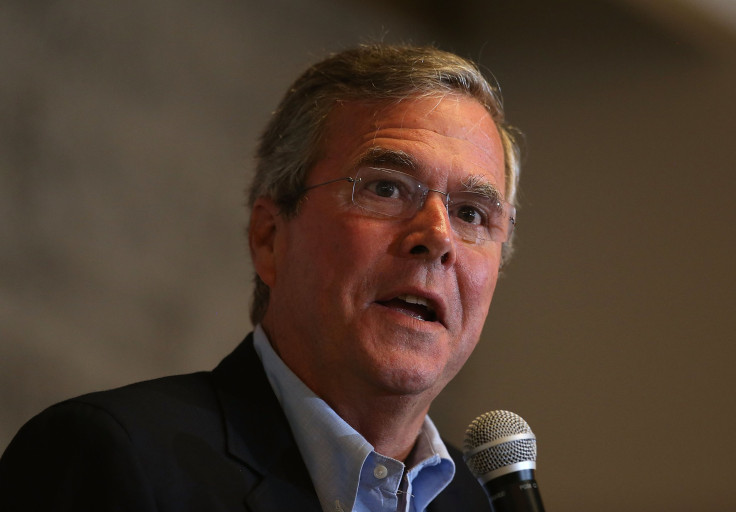Jeb Bush Slams Lobbyists Despite His Close Relationship With Them

Jeb Bush on Monday returned to the Florida capital to deliver a speech slamming lobbyists as a corrosive influence on public policy, and railing on the practice of public officials becoming professional influence peddlers. The jeremiad may have come as a shock to Tallahassee's government officials-turned-lobbyists whom Bush enlisted to help him sculpt his gubernatorial agenda, and who are now helping bankroll his Republican presidential campaign.
In his speech, the former Florida governor said that as president he would push to ban lawmakers from becoming lobbyists for six years after they leave government. He decried the fact that before he was governor, Tallahassee "lobbyists and legislators grew a little too comfortable in each other's company." He portrayed himself as an opponent of such a “culture,” asserting: "Even before I took office, I signaled a new way of doing business by forbidding lobbying by any member of my transition team."
But a previous International Business Times review of Bush's emails and Florida lobbying records shows that Bush regularly sought public policy counsel from the Southern Strategy Group. That lobbying firm -- which has employed former Florida officials and is among the top donors to Bush's presidential campaign -- was created by Paul Bradshaw, a former government official. Bradshaw's wife, Sally, led Bush’s transition team before becoming his first chief of staff in 1999. (She is now a senior adviser to his presidential campaign.) Another member of Bush's transition team, David Rancourt, served as Bush’s deputy chief of staff for less than a year before joining Southern Strategy Group. The firm would also hire former Florida House Speaker John Thrasher, a close Bush ally. Thrasher is now the president of Florida State University, where Bush delivered his anti-lobbyist speech.
While governor, Bush corresponded with Southern Strategy Group lobbyists over state government contracts, medical malpractice legislation, and state land acquisition deals. In emails, Thrasher and Bush specifically discuss organizing support for a Bush-backed bill benefiting the Southern Strategy Group's health industry clients. Bush separately approved a plan for corporate lobbyists to help his administration pass a bill exempting the state’s pension investments from Florida’s open records laws. Near the beginning of his second term, he also asked Rancourt for overall counsel on what his gubernatorial agenda should be, writing to the lobbyist: “If you were governor, what would you be focusing on for the next two or three years. What initiatives do you think we should pursue? How do you think we should do it?”
In response to IBTimes' questions about Bush's relationship with lobbyists, Bush’s campaign spokesperson, Kristy Campbell, said: "Governor Bush has a conservative record of reform, cutting taxes, eliminating government waste, reforming broken government programs and curbing the influence of special interests. He sought feedback from Floridians across the board, but his record is evidence that special interests had no sway in his decisions." When previously asked about lobbyists raising money for for Bush, Campbell told IBTimes that the former governor is "pleased and encouraged to have support for his presidential campaign from a broad range of voters and donors."
In Florida, many of Bush’s policies ended up helping Southern Strategy Group clients. His administration approved AT&T’s telephone rate increases and its merger with BellSouth, a medical malpractice bill benefiting the Florida Hospital Association, and the acquisition of swampland from Land South Hunters -- all organizations represented by the Southern Strategy Group. On a few occasions, Bush also emailed the firm’s lobbyists advance copies of public policy speeches.
While Bush was governor, Southern Strategy delivered $76,000 worth of donations to the Florida Republican Party. Now, during his presidential campaign, Southern Strategy Group employees have delivered more than $28,000 to his campaign, making the firm the third largest source of donations from employees at a single company. That money is in addition to the more than $228,000 lobbyists have raised for Bush’s 2016 bid -- and does not include donations to the super PAC supporting his campaign, which has not yet reported the details of its finances.
When Bush announced his presidential campaign in June, he made criticism of lobbyists a central focus of his speech. But lobbyist Al Cardenas told The Hill newspaper that he “talked to him privately” and said that Bush “understands that the lobbying world -- at its best -- is well-informed and educates policymakers.” The Washington Post has reported that some lobbyists are now informally advising Bush. Vin Weber, a former congressman turned lobbyist, said he has exchanged emails with Bush and spoken at Bush events. He said of Bush’s campaign: “I want to coordinate policy to the extent that I can.” Weber is one of at least three congressmen-turned-lobbyists reportedly backing Bush's campaign.
While Bush today says he took a tough stance against lobbyists as governor, one top Tallahassee lobbyist, Ron Book, told IBTimes last month that Bush did not close the door to lobbyists.
“I never felt like I didn’t get an opportunity to make my case on behalf of my clients,” Book said. “I never felt like he shut us out.”
© Copyright IBTimes 2024. All rights reserved.






















